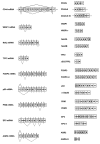Aberrant mRNA splicing generates oncogenic RNA isoforms and contributes to the development and progression of cholangiocarcinoma
- PMID: 30906543
- PMCID: PMC6403481
- DOI: 10.3892/br.2019.1188
Aberrant mRNA splicing generates oncogenic RNA isoforms and contributes to the development and progression of cholangiocarcinoma
Abstract
Cholangiocarcinoma is a lethal biliary cancer, with an unclear molecular pathogenesis. Alternative splicing is a post-transcriptional modification that generates mature mRNAs, which are subsequently translated into proteins. Aberrant alternative splicing has been reported to serve a role in tumor initiation, maintenance and metastasis in several types of human cancer, including cholangiocarcinoma. In this review, the aberrant splicing of genes and the functional contributions of the spliced genes, in the carcinogenesis, progression and aggressiveness of cholangiocarcinoma are summarized. In addition, factors that influence this aberrant splicing that may be relevant as therapeutic targets or prognosis markers for cholangiocarcinoma are discussed.
Keywords: alternative splicing; cholangiocarcinoma; spliced gene.
Figures


References
-
- Banales JM, Cardinale V, Carpino G, Marzioni M, Andersen JB, Invernizzi P, Lind GE, Folseraas T, Forbes SJ, Fouassier L et al. Expert consensus document: Cholangiocarcinoma: current knowledge and future perspectives consensus statement from the European Network for the Study of Cholangiocarcinoma (ENS-CCA) Nat Rev Gastroenterol Hepatol 13. 2016:261–280. doi: 10.1038/nrgastro.2016.51. - DOI - PubMed
-
- Thuwajit C, Thuwajit P, Kaewkes S, Sripa B, Uchida K, Miwa M, Wongkham S. Increased cell proliferation of mouse fibroblast NIH-3T3 in vitro induced by excretory/secretory product(s) from Opisthorchis viverrini. Parasitology 129. 2004:455–464. - PubMed
LinkOut - more resources
Full Text Sources
